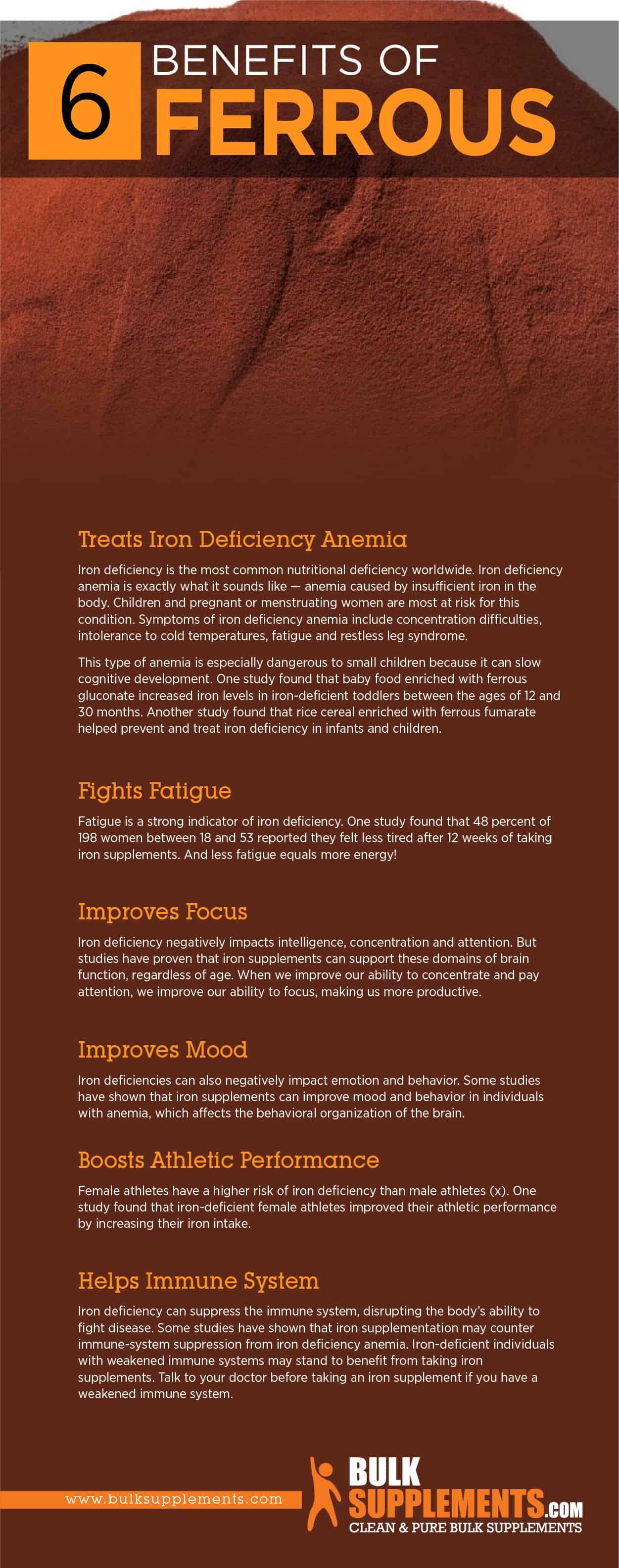What are Ferrous Gluconate and Ferrous Fumarate?
Ferrous gluconate and ferrous fumarate are iron supplements. Why is iron important? The body uses it to make hemoglobin and myoglobin — proteins that carry oxygen in our blood and store oxygen in our muscles. Having low iron means the body and muscles don’t get enough oxygen, which can cause fatigue, weakness and concentration difficulties, among other things.
There are two critical facts about iron to consider:
- Iron is an essential component for human life, but our bodies don’t make it themselves. We have to ingest it in our food or iron supplements.
- A quarter of the world’s population doesn’t get enough iron.
Ferrous gluconate and ferrous fumarate to the rescue! These iron supplements are available in powders, made from either the greenish-yellow ferrous gluconate powder or the reddish-orange ferrous fumarate powder.
Doctors commonly prescribe ferrous gluconate to treat individuals with iron deficiency anemia, though it also serves to prevent low iron in the blood (x). Some benefits of taking iron supplements like these are that they decrease fatigue, improve focus, boost athletic performance and support the immune system.
How do you know when you don’t have enough iron in your system? Why would you want to increase your iron intake? What’s the difference between iron in food and iron in supplements? And is having too much iron a problem?
Ferrous Gluconate and Ferrous Fumarate Benefits
Treats Iron Deficiency Anemia
Iron deficiency is the most common nutritional deficiency worldwide (x). Iron deficiency anemia is exactly what it sounds like — anemia caused by insufficient iron in the body. Children and pregnant or menstruating women are most at risk for this condition. Symptoms of iron deficiency anemia include concentration difficulties, intolerance to cold temperatures, fatigue and restless leg syndrome (x).
This type of anemia is especially dangerous to small children because it can slow cognitive development (x). One study found that baby food enriched with ferrous gluconate increased iron levels in iron-deficient toddlers between the ages of 12 and 30 months (x). Another study found that rice cereal enriched with ferrous fumarate helped prevent and treat iron deficiency in infants and children (x).
It has also proven to be the most tolerable and effective treatment for iron deficiency anemia in pregnant women and postpartum mothers (x). But in general, both ferrous gluconate and ferrous fumarate have proven effective treatments for iron deficiency anemia in men and women alike (x).
Fights Fatigue
Fatigue is a strong indicator of iron deficiency. One study found that 48 percent of 198 women between 18 and 53 reported they felt less tired after twelve weeks of taking iron supplements (x). And less fatigue equals more energy!
Improves Focus
Iron deficiency negatively impacts intelligence, concentration and attention. But studies have proven that iron supplements can support these domains of brain function, regardless of age (x). When we improve our ability to concentrate and pay attention, we improve our ability to focus, making us more productive.
Improves Mood
Iron deficiencies can also negatively impact emotion and behavior. Some studies have shown that iron supplements can improve mood and behavior in individuals with anemia, which affects the behavioral organization of the brain (x).
Boosts Athletic Performance
Female athletes have a higher risk of iron deficiency than male athletes (x). One study found that iron-deficient female athletes improved their athletic performance by increasing their iron intake (x).
Helps Immune System
Iron deficiency can suppress the immune system, disrupting the body’s ability to fight disease (x). Some studies have shown that iron supplementation may counter immune-system suppression from iron deficiency anemia (x). Iron-deficient individuals with weakened immune systems may stand to benefit from taking iron supplements. Talk to your doctor before taking an iron supplement if you have a weakened immune system.

The Basics of Iron and Iron Supplements
Now you understand why iron is essential to the body. So, what makes one iron supplement different from another? Let’s start with the basics. There are two types of iron — heme iron, found in food, and nonheme iron, found in supplements. And the two main types of iron supplements are ferrous salts and ferric iron. What does ferrous mean? It means “consisting of iron.” The difference between ferrous and ferric is in their chemical makeup. In a nutshell, each is a type of iron ion in different states of oxidation (x). When it comes to supplements, ferrous salts tend to be more popular than ferric iron due to their effectiveness and lower price points. The body also seems to tolerate ferrous salts better (x).
Ferrous Gluconate and Ferrous Fumarate vs. Ferrous Sulfate
The main members of the ferrous-salt family are ferrous gluconate, ferrous fumarate and ferrous sulfate. The body is able to absorb ferrous sulfate better and put it to work more rapidly. However, the quick absorption can mean more negative side effects on the stomach.
According to the Journal of Family Practice, ferrous gluconate and ferrous sulfate are equally tolerable (x). There is less elemental iron in each dose of ferrous gluconate, which means consumers generally experience fewer adverse side effects. The body can also absorb ferrous fumarate as readily as it can ferrous sulfate. But because ferrous fumarate contains less elemental iron in each dose, it’s gentler on the stomach.
Other Facts About Iron
The body absorbs iron better with vitamin C, so try taking iron supplements with vitamin C–rich beverages such as orange juice (x). But here’s a fun fact — cooking with cast iron pots and pans can, according to UCSF Health, increase your iron intake by up to 80 percent (x).
Ferrous Gluconate and Ferrous Fumarate Side Effects and Dosage
The daily dose for ferrous gluconate is 150 milligrams, and 55 milligrams for ferrous fumarate. But side effects are possible even if you stick to our recommended dosages. Side effects include constipation, flatulence, stomach or abdominal pain, abdominal bloating, dark urine or stool, loss of appetite, nausea and vomiting. Ferrous gluconate can also temporarily stain the teeth (x).
It is best that you consume either supplement one to two hours before or after eating. Dairy products, coffee, tea or antacids, as well as fish, meats, liver, whole grains or fortified breads or cereals can inhibit the proper absorption and functioning of these supplements (x).
If you have a history of alcohol abuse, iron overload syndrome, porphyria, thalassemia, regular blood transfusions, liver problems, kidney problems or stomach/intestinal problems, avoid this supplement. One critical note — keep all iron supplements away from children. Too much iron is poisonous to children.
Talk to your doctor before taking iron supplements as the following two points are important to consider:
- Too much iron can be toxic. Very little iron leaves the body except through the blood, so excessive iron can build up in your system to toxic levels (x).
- Iron may interact with medications, which may inhibit their effects and be very dangerous (x).
The Bottom Line
Iron is essential to life, and our bodies don’t make it themselves. When we don’t consume enough of it in our food, iron supplements such as ferrous gluconate or ferrous fumarate can prevent iron deficiency and treat iron deficiency anemia. When our bodies have sufficient iron in them, they function as they should. Iron helps our immune systems stay strong, improves our moods, helps our focus and keeps us awake. Athletes may especially benefit from taking these iron supplements.


